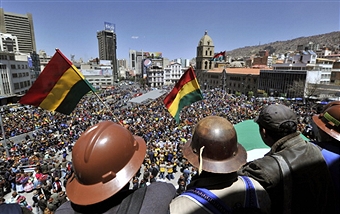
Bolivia's mining headaches
September 25, 2012 - blogs.ft.com
by Andres Schipani
Next time a president of a resource-rich country thinks nationalisation of mining assets is a way of solving internal conflicts, s/he would do well to take a look at Bolivia, where salaried and independent miners have been violently fighting for the control of a recently nationalised mine.
Back in late June, the government revoked the Colquiri mining licence of Sinchi Wayra, a wholly owned subsidiary of Swiss-based commodities giant Glencore. Leftist President Evo Morales seized control of the mine in a bid to end a conflict between salaried, unionised workers, and independent, co-operative miners who were fighting to take over the country's second-biggest tin mine by force.
Now, with the mine in the hands of the Andean country's state-run mining company, Comibol, it seems Colquiri is back to square one with both groups of miners tossing sticks of dynamite and rocks at each other in an on-going violent standoff. Independent miners, who have formed legal co-operatives of thousands, are fighting their right to extract minerals against the salaried miners, who having worked for Glencore and now for Comibol, are demanding the state to expand their share and take over the whole mine.
"They are entrenched. We are as well. We want the government to give us a definitive solution because, it seems, the nationalisation was not one," Severino Estakani, the head of Colquiri's salaried miners' union told beyondbrics over the phone, while in the thick of it.
Conflict began about ten days ago when both groups claimed control of one vein of the mine that is estimated to hold as much as $5bn in untapped reserves of zinc and tin. Since then, hundreds of Bolivian miners have been blocking road access to the country's capital, La Paz and to Colquiri; work at the mine has been at a standstill with over $5m in production lost; a miner has been killed and several others injured; and the head of Comibol, Hector Córdova, resigned.
According to Bolivia's mining ministry, Colquiri is expected to produce about 3,000 tonnes of tin concentrates this year, about 15 per cent of estimated national output of 21,000 tonnes. Most of the rest of Bolivia's tin is produced at the state-run Huanuni mine, a mine that also suffered a similar standoff in the recent past.
The mining stalemate might force Morales to re-think how to evenly redistribute natural resources after nationalisation. But mining is a delicate issue in Bolivia economically, as well as a politically.
Revenues from mining exports jumped 50 per cent to $3.7bn last year, and have grown almost fivefold since Morales took office six years ago. Today, they represent about 40 per cent of the Andean country's total exports, trailing just behind gas exports.
Yet Morales is in a difficult position because miners are some of his most stalwart supporters – in the polling stations as well as the streets, where real politics resides in Bolivia. According to the national miners' union, there are currently only 10,000 miners employed by the state, compared to over 120,000 co-operative ones across the country who have said they are ready to help their peers with nationwide strikes and pickets, if necessary.
The mining strikes comes as Morales and his government are undertaking a sweeping review of the nation's mining code, in order to boost government revenues. It is trying to entice private companies to partner with Comibol, which would take majority ownership and 55 per cent of profits.
Images of the violent stand-off is probably not going to help entice investors.